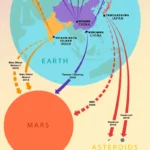Last Updated: October 2025
Last Updated: October 2025
At OrbitScholar.com, we believe in curiosity, credibility, and clarity. Our goal is to make space exploration, astronomy, and scientific discovery understandable and exciting for everyone — while maintaining the highest standards of accuracy, integrity, and transparency in everything we publish.
1. Our Editorial Mission
OrbitScholar’s mission is to bring the universe closer to people — through simple explanations, factual reporting, and evidence-based storytelling.
We aim to:
- Share current developments from NASA, ISRO, ESA, SpaceX, and other leading agencies
- Explain scientific concepts in everyday language
- Encourage curiosity, learning, and critical thinking among readers
2. Accuracy and Fact-Checking
Every article published on OrbitScholar goes through a two-step review process:
- Research & Source Validation — Our editors verify information using primary sources such as scientific journals, official press releases, or verified statements from credible institutions.
- Fact Cross-Checking — Data points, numbers, and quotes are checked against multiple references before publication.
When new research or official clarifications emerge, we update existing articles promptly to ensure readers always access the latest and most accurate information.
3. Editorial Independence
OrbitScholar operates with editorial independence.
Our content is not influenced by advertisers, sponsors, or affiliate partners.
While we may earn commissions through affiliate links (see our Disclaimer), such relationships do not affect our editorial decisions, topic selection, or conclusions.
All editorial choices are made solely to inform and engage readers, not to promote any brand or organization.
4. Sources and Citations
We believe in transparent sourcing.
When possible, we link directly to:
- Peer-reviewed research
- Space agency publications
- Government or academic websites
- Reputable science news outlets
If an article includes theoretical discussions or emerging research, we label them clearly as “early findings” or “hypotheses.”
5. Updates and Corrections
Accuracy is an evolving process in science journalism.
If we discover an error — factual, typographical, or interpretative — we:
- Correct it immediately
- Add a note at the bottom of the article indicating the date and nature of the correction
Readers can report potential corrections or inaccuracies via contact@orbitscholar.com
6. Expert Contributions
At times, OrbitScholar may feature content contributed by subject-matter experts, guest writers, or educators.
All guest articles undergo editorial review for accuracy and readability.
Contributors are required to disclose conflicts of interest or affiliations that may influence their perspective.
7. Use of AI and Automation
We occasionally use AI tools (e.g., for grammar checking, research summarization, or visual enhancement) — but final review and fact-verification are always conducted by human editors.
AI-assisted sections are never published without human oversight and editorial approval.
8. Reader Engagement and Feedback
We encourage reader participation through comments, emails, and suggestions.
Constructive feedback helps us improve clarity, coverage, and depth.
However, we reserve the right to moderate comments that are offensive, spam-like, or unrelated to science and education.
9. Transparency and Affiliations
OrbitScholar is an independent science publication.
We are not affiliated with any government, corporate, or academic institution.
Any partnerships or sponsorships will be openly disclosed on relevant pages.
10. Our Promise
At OrbitScholar.com, we are guided by three core editorial values:
- Clarity – making complex science understandable
- Credibility – upholding facts and evidence
- Curiosity – inspiring exploration and lifelong learning
We believe science is for everyone.
Our editorial policies ensure we deliver content that informs, empowers, and inspires — every single time.
Contact: contact@orbitscholar.com
Website: https://orbitscholar.com










